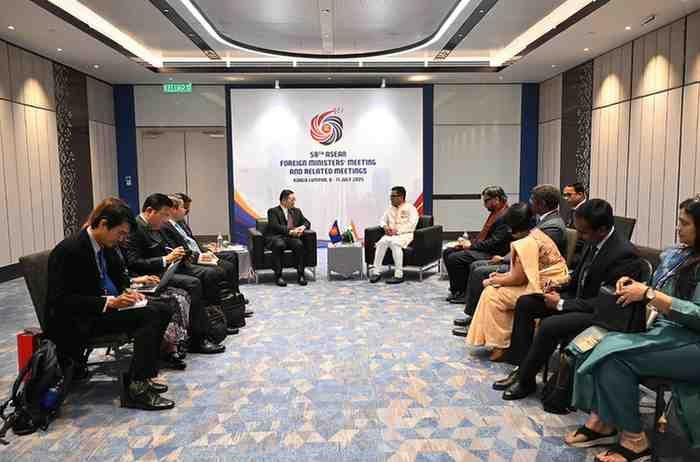Kuala Lumpur: Shri Pabitra Margherita, Union Minister of State for External Affairs and Textiles, led the Indian delegation to three significant diplomatic engagements held in Kuala Lumpur on 10 and 11 July 2025.
The meetings included the ASEAN-India Foreign Ministers’ Meeting (AIFMM), the 15th East Asia Summit Foreign Ministers’ Meeting (EAS FMM), and the 32nd ASEAN Regional Forum (ARF).
Regional Security Takes Centre Stage at ARF
The 32nd ASEAN Regional Forum, also held on 11 July, provided a vital platform for candid and constructive exchanges on pressing geopolitical issues.
Minister Margherita raised serious concerns about the persistent and evolving threat of cross-border terrorism emanating from Pakistan, particularly in the context of the recent heinous terrorist attack in Pahalgam, Jammu and Kashmir.
He strongly condemned the attack and reiterated India’s steadfast commitment to countering terrorism in all its forms and manifestations.
Emphasizing the need for international cooperation and concerted regional action, he welcomed the role of ASEAN-led mechanisms in fostering dialogue and building trust among regional actors.
He described the emerging security architecture under ASEAN leadership as essential for promoting peace and stability in the Indo-Pacific.
Strengthening India-ASEAN Ties
During the ASEAN-India Foreign Ministers’ Meeting held on 10 July, Minister Margherita reaffirmed India’s enduring support for Malaysia’s 2025 Chairmanship of ASEAN and reiterated India’s principled commitment to ASEAN’s unity and centrality.
He commended the progress made under the 10-Point proposal introduced by Prime Minister Shri Narendra Modi at the 21st ASEAN-India Summit held in Lao PDR in 2024. The proposal is a comprehensive roadmap to bolster the ASEAN-India Comprehensive Strategic Partnership across multiple dimensions.
Minister Margherita also highlighted the wide range of initiatives undertaken this year under the India-ASEAN Year of Tourism, showcasing the people-to-people and cultural connect between India and Southeast Asia.
He emphasized the importance of early finalization of the review of the ASEAN-India Trade in Goods Agreement (AITIGA), aimed at further enhancing trade flows and economic integration between the two regions.
He also reiterated India’s commitment to deepening development cooperation in priority sectors such as digital transformation, maritime security, public health, and innovation—key areas identified for mutual benefit.
20 Years of East Asia Summit: A Milestone
On 11 July, during the 15th Foreign Ministers’ Meeting of the East Asia Summit (EAS), Shri Margherita acknowledged the EAS’s pivotal role as a Leaders-led strategic platform that has contributed to regional peace, stability, and prosperity over the past two decades.
He participated in discussions on current global and regional challenges and stressed India’s unwavering support to further strengthen the EAS framework. The Minister noted the importance of an open, inclusive, and rules-based Indo-Pacific and urged all stakeholders to uphold the principles of sovereignty, territorial integrity, and peaceful resolution of disputes.
Preparations for the upcoming 20th EAS Summit scheduled for October 2025 were also reviewed during the session.
Bilateral Diplomacy on the Sidelines
In addition to his participation in the multilateral meetings, the Indian Minister of State held several bilateral discussions on the sidelines. He met with the Secretary General of ASEAN and engaged in separate meetings with the Foreign Ministers of Cambodia, the Philippines, and Timor Leste.
These interactions focused on deepening bilateral ties, expanding economic cooperation, and enhancing collaboration in regional and international fora.
India’s Growing Role in the Indo-Pacific
The Indian delegation’s active participation at all three forums reflects New Delhi’s growing diplomatic footprint in the Indo-Pacific region.
From economic integration to security cooperation and people-to-people ties, India continues to champion a collaborative, inclusive, and transparent regional order anchored in ASEAN centrality.
The Kuala Lumpur meetings marked an important step forward in India’s strategic engagement with Southeast Asia and reaffirmed its commitment to being a reliable partner in ensuring peace, prosperity, and progress across the region.








